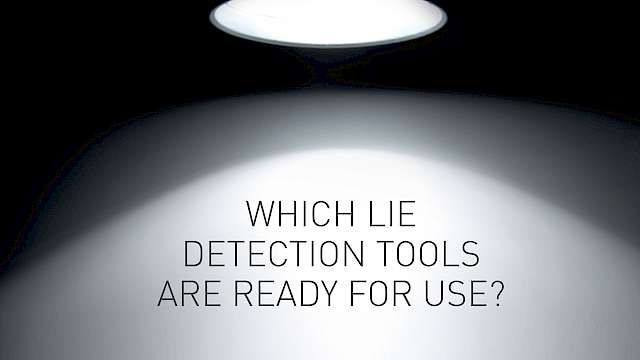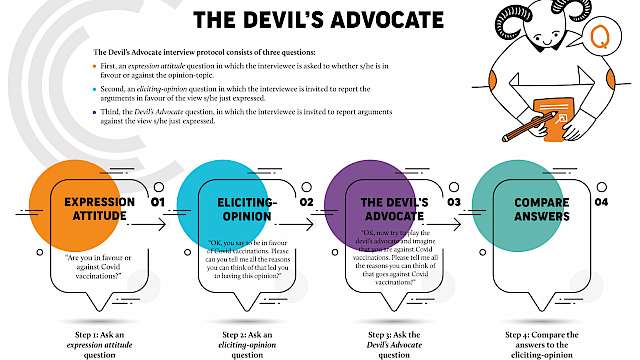The verbal cues lie tellers spontaneously report during interviews are weak and unreliable. Researchers therefore started to develop interview protocols focusing on enlarging such differences. Most of them deal with distinguishing between truthful and deceptive statements about alleged activities. The Devil’s Advocate Approach is the only interview protocol aimed to distinguish between truthful and deceptive opinions.
The Devil’s Advocate Approach is the only interview protocol aimed to distinguish between truthful and deceptive opinions.
The Devil’s Advocate Approach Rationale
The Devil’s Advocate interview protocol consists of three questions:
- First, an expression attitude question in which the interviewee is asked to whether s/he is in favour or against the opinion-topic.
- Second, an eliciting-opinion question in which the interviewee is invited to report the arguments in favour of the view s/he just expressed.
- Third, the Devil’s Advocate question, in which the interviewee is invited to report arguments against the view s/he just expressed.
In the Devil’s Advocate interview protocol, the answers to the eliciting-opinion and devil’s advocate questions are compared. Truth tellers provide honest answers to both questions. When answering the eliciting-opinion question they provide arguments they believe in. Although they present arguments in the devil’s advocate answer they do not believe in, they are telling the truth because they do not pretend to believe in these answers. Lie tellers have an opinion opposite to what they express. They lie when answering both the eliciting-opinion and devil’s advocate questions. In the eliciting-opinion answer they provide arguments they do not believe in whilst trying to convince the interviewer that they endorse these arguments.
When providing the Devil’s Advocate answer they are invited to give arguments against their alleged opinion, which is an invitation to express their true opinion. Yet, they are lying because they must pretend not to believe in the arguments they present when answering the devil’s advocate question.
Truth tellers should find it easier to respond to the eliciting-opinion question than to the devil’s advocate question. Arguments that support someone’s attitude (eliciting-opinion question) are typically more readily available than reasons that oppose someone’s attitude (devil’s advocate question). Lie tellers are unlikely to show the opposite pattern to truth tellers’ responses, because lie tellers will be motivated to use at least two counter-interrogation strategies: Preparation and consistency. Lie tellers will probably think, prior to the interview, about arguments they can present that support their pretended opinion. This should improve the eloquence of their replies to the eliciting-opinion question. Lie tellers also strive to be consistent.
Consistency in the Devil’s Advocate interview would mean providing replies of similar eloquence to the eliciting-opinion and devil’s advocate questions. The Devil’s Advocate Approach therefore expects that lie tellers may attempt to produce similar responses to the eliciting-opinion and devil’s advocate questions.
Verbal cues
The verbal cues measured in the Devil’s Advocate Approach refer to eloquence. The more plausible and more immediate the response, the more eloquent the response is. Plausibility is defined as “Does the answer sound reasonable and genuine and was there enough of an answer to sound convincing”; Immediacy is defined as “Is the answer given from a personal perspective and not distanced”. See Box 1 for examples.
Hypotheses
In the Devil’s Advocate Approach, two veracity differences can be distinguished. First, veracity differences when answering the eliciting-opinion question. It is expected that truth tellers are more eloquent than lie tellers when answering the eliciting-opinion question. Second, veracity differences when comparing answers to the eliciting-opinion and devil’s advocate questions. It is expected that truth tellers are more eloquent when answering the eliciting-opinion question than when answering the devil’s advocate question, whereas such difference is less noticeable in lie tellers.
Findings to date
Research to date showed support for both predictions:
- Truth tellers sounded more plausible and more immediate than lie tellers when answering the eliciting-opinion question;
- Truth tellers, more than lie tellers, sounded more plausible and more immediate when answering the eliciting-opinion question than when answering the devil’s advocate question. The effect sizes showed that these differences are large enough to be detected with the naked eye during interviews
Read more
Vrij, A., Leal, S., & Fisher, R. P. (2023). Interviewing to detect lies about opinions: The Devil’s Advocate Approach.
Copyright Information
As part of CREST’s commitment to open access research, this text is available under a Creative Commons BY-NC-SA 4.0 licence. Please refer to our Copyright page for full details.
IMAGE CREDITS: Copyright ©2024 R. Stevens / CREST (CC BY-SA 4.0)






